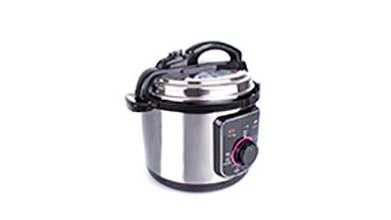
Do you use a Pressure Cooker for making bariatric recipes? If you haven’t tried it, you should
A pressure cooker is an electric cooking device that utilizes pressure and high temperatures to cook foods quickly. It comes with a host of benefits:
- Safe to use
- Cooks quickly (30-40 minutes compared to 4-8 hours in a slow cooker, and some recipes take just 3-5 minutes)
- Many uses (saute, pressure cook, slow cooker, food warmer, yogurt maker, and more)
- Consistently produces tender meat
- Can cook straight from frozen
You can make meats, stews, soups, yogurt, hard boiled eggs, steamed vegetables, and literally hundreds of other ideas. But for gastric sleeve, gastric bypass, and lap band patients, it’s two main benefits are: that it’s fast and the meat comes out tender. Well, OK, the third benefit is that the hard boiled eggs consistently have easy to peel shells. This is major for weight loss surgery patients who struggle to peel hard boiled eggs and lose half the protein by picking away the egg shell until it looks like a crater on the moon (or is that just me?).
For anyone worried about the horror stories about pressure cookers from decades ago, this is not the same device as the one your parents or grandparents used to use. These updated machines have built in safety measures. There are several different brands of pressure cookers on the market with fairly reasonable price tags: Instant Pot, Presto, Breville, Ninja, and even Crock Pot. Although prices can vary, you can find a good pressure cooker for around $100, which considering it’s versatility might be one of the most cost effective small kitchen appliances on the market (we’re looking at you stand mixer).
If you don’t want to buy one without knowing if you like it, consider asking a friend or family member to borrow theirs for a day (if they’ll let it go for that long). Or go on the internet and search for bariatric friendly pressure cooker recipes. It may open you up to a wide variety of high protein recipes that can help you stay on your post-op surgery diet and maximize your weight loss success.
The above suggestion is from Dr. Shillingford’s office, which does not receive any benefit from encouraging you to try a pressure cooker.
Dr. Shillingford, MD, PA is a bariatric surgeon specializing in gastric sleeve, gastric bypass, lap band, and revisional surgery. Dr. Shillingford encourages his weight loss surgery patients to eat their protein first, then vegetables and fruits. Consuming adequate protein is important for bariatric patients to lose weight while maintaining their lean muscle mass. For more information on gastric sleeve, gastric bypass, and lap band surgery or to schedule your free informational session, send a request to Dr. Shillingford’s office or call today (561) 483-8840. Dr. Shillingford performs most bariatric procedures at Northwest Medical Center and is conveniently located nearby to Boca Raton, Coral Springs, West Palm Beach, Wellington, and Miami.



